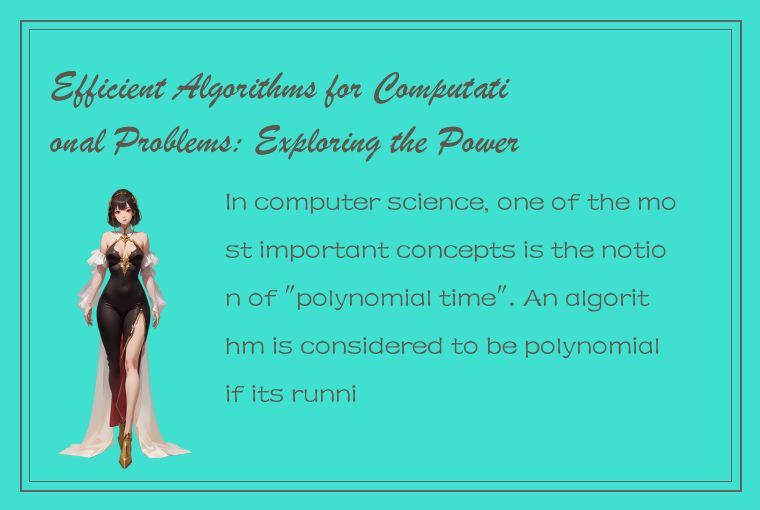In computer science, one of the most important concepts is the notion of "polynomial time". An algorithm is considered to be polynomial if its running time is bounded by a polynomial function of the input size. In other words, the time required for an algorithm is proportional to the number of bits in the input. This is contrasted with non-polynomial time, where the running time is exponential or worse, which is considered intractable.

The significance of polynomial time is twofold. First, it provides a practical measure of algorithmic efficiency. Polynomial-time algorithms are generally considered feasible for solving large-scale problems, whereas non-polynomial-time algorithms are often impractical, if not impossible to implement. Second, the notion of polynomial time is closely related to the class of problems that can be solved with a reasonable amount of computing resources, known as the class P.
The study of polynomial-time algorithms is a major area of research in computer science. Understanding what problems are solvable in polynomial time is a fundamental question in computational complexity theory. The power of polynomial time has been explored in many different ways, leading to the discovery of many efficient algorithmic techniques that are widely used today.
One of the most famous examples of a polynomial-time algorithm is the dynamic programming algorithm for the knapsack problem. The knapsack problem is a classic optimization problem in which a set of items must be packed into a knapsack of limited capacity, with the goal of maximizing the total value of the packed items. The dynamic programming algorithm solves the problem by breaking it down into smaller subproblems, solving each subproblem once and storing the solution in a table. The algorithm then uses the table to compute the optimal solution to the original problem.
Another example of a polynomial-time algorithm is the fast Fourier transform (FFT) algorithm for computing the discrete Fourier transform (DFT) of a sequence of numbers. The DFT is a fundamental tool in signal processing and data analysis, and the FFT algorithm makes it possible to compute the DFT efficiently, even for large data sets. The FFT algorithm is based on the mathematical properties of the DFT and exploits the symmetry and periodicity of the data to reduce the number of computations required.
Polynomial-time algorithms are also used extensively in graph algorithms. For example, the shortest path problem seeks to find the shortest path between two vertices in a graph, and many different polynomial-time algorithms have been developed for solving this problem. One of the most famous is Dijkstra's algorithm, which works by maintaining a priority queue of vertices and exploring the vertex with the lowest cost at each step. The algorithm maintains a table of tentative distances and updates them as it explores the graph, eventually finding the shortest path from the starting vertex to all other vertices in the graph.
In conclusion, efficient algorithms for computational problems are essential for many applications in computer science, physics, engineering, and other fields. The notion of polynomial time provides a practical measure of algorithmic efficiency and is closely related to the class of problems that can be solved with a reasonable amount of computing resources. Polynomial-time algorithms have been extensively studied and many efficient algorithmic techniques have been developed as a result. As computing technology continues to advance, the power of polynomial-time algorithms will only increase, leading to the development of new and more efficient algorithms for solving a wide range of problems.




 QQ客服专员
QQ客服专员 电话客服专员
电话客服专员